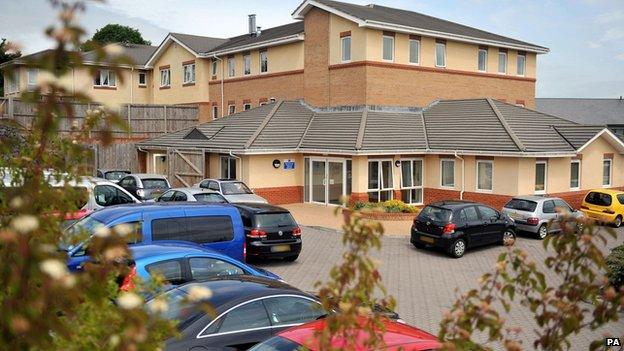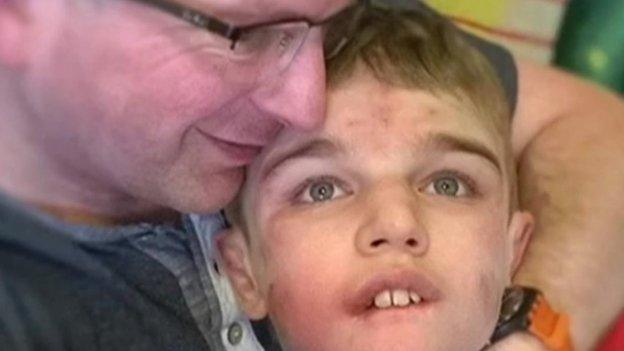Care of learning disability patients: Reform 'remains slow'
- Published

The author of a review into the care of people with learning disabilities in England has reported an "absence of any tangible progress" since he issued it.
Sir Stephen Bubb headed the review which was prompted by the Winterbourne View care home abuse scandal in 2011.
His analysis, published in November, urged the closure of some in-patient facilities and more community services.
England's chief nursing officer said improvements must be made "at a fast but safe pace".
'Warning call'
Neglect and abuse of patients by staff at Winterbourne View, a private residential hospital near Bristol, was uncovered by BBC Panorama. Six people were jailed in 2012 and five given suspended sentences.
Sir Stephen said that although the number of people being discharged from Winterbourne-style institutions was now greater than those being admitted, "it remains abundantly clear that a revolving door of discharges and admissions will continue unless a closure and transition programme is acted on".
He said although NHS England had made it a "top strategic objective" to improve conditions for people with learning disabilities, "the pace of change remains slow, and this is unacceptable".
Sir Stephen, who is chief executive of the Association of Chief Executives of Voluntary Organisations (ACEVO), said there appeared to be "no dialogue" between NHS England and third sector providers, such as charities and community organisations, about how to deliver the transition.
He said this six-month review should be treated as a "warning call" ahead of a "formal stock take of actions" in a further six months' time.

Analysis
by Alison Holt, BBC social affairs correspondent
The key point that Sir Stephen Bubb is making in today's review is that if institutions are to close then people need somewhere to go.
NHS England maintains it is committed to shutting assessment and treatment units and that change will happen at a pace that is fast and safe.
Sir Stephen does not question the commitment, but is clearly worried that six months on from his first report, the NHS still doesn't seem to be talking to the organisations at grass roots level that will put the new facilities in place in the community.
And it will take time for the right places to be found and set up to provide care that is tailored to each person's needs.
For people with learning disabilities and autism the difference is between living your life in a hospital and living it in a home.
Many of their families argue they have already had to wait far too long.

"The core recommendation of my report was the need to close these institutions as quickly as possible and you can't close them until there is good strong community provision - people with learning disabilities and their families deserve action now," Sir Stephen said.
"There's huge scepticism that anything will happen. NHS England needs to prove them wrong.
"And until I see action on the ground I will continue to (hold the) government to account."
He called for an independent taskforce to be set up to get the third sector organisations involved.

The Winterbourne View residential hospital was closed in 2011
His report published in November - Winterbourne View - Time for Change, external - offered 10 recommendations, including a "charter of rights" for people with learning disabilities and/or autism and their families.
Sir Stephen said he welcomed the Care Act, which came into effect in April and includes rights for those receiving care and those who provide it to their loved ones.
He also welcomed the Department of Health Green Paper on the rights of people with learning disabilities and/or autism, along with the commitment made by NHS England chief executive Simon Stevens to publish a full transition programme in the autumn.
'Safe pace'
In a joint statement, Jan Tregelles, chief executive of Mencap, and Viv Cooper, chief executive of the Challenging Behaviour Foundation, said change would not happen unless community services were improved.
"This must include investing in a highly skilled community workforce to support children and adults with a learning disability to meet their individual needs," they said.
Jane Cummings, chief nursing officer for England and chairwoman of the Transforming Care Delivery Board, said: "All the agencies involved in this work are clear that while a great deal of progress has been made we still have lots to do to transform and improve care for people with learning disabilities.
"We are committed to driving through changes at a fast but safe pace, we are on track to do so, and I will be setting out the closure and reprovision plans in October as previously announced."
- Published1 April 2015

- Published26 November 2014
